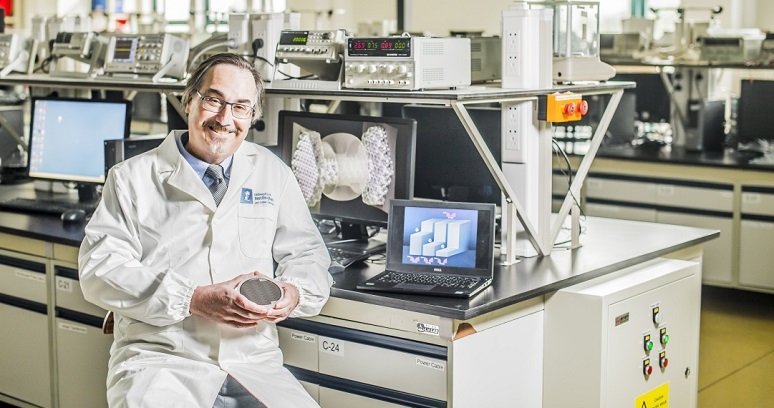
Professor Jim Greer
Li Dak Sum Chair Professor in Advanced Electronic Materials and Devices
Professor Jim Greer, Li Dak Sum Chair Professor in Advanced Electronic Materials and Devices, has about 40 years studying the chip and its fundamental structure and material science.
Professor Jim Greer grew up in Dallas, Texas, a city headquartered Texas Instruments, where the first integrated circuit was invented. Jim knew that he could easily find a job as a technician or engineer and he chose electrical engineering when he went to university.
When he graduated from the University of Texas, Austin, he started to work at Mostek, an integrated circuit manufacturer, as a product engineer. It was an exciting time in the semiconductor industry. He was responsible for the production of all static Read-Only Memories (ROMs).
He later ended up working at Texas Instruments for a couple of years. He began focusing on transistors and the physics of how they operated. This experience sparked his interest in learning more about physics in addition to his engineering background.
Then he spent a year studying at Trinity College Dublin and received MSc in Theoretical Physics. After that, he continued to pursue a PhD at the University of Freiburg in Germany.
Jim Greer has been devoted to the research of micro- and nano-electronics and he had worked at the Tyndall National Institute in Ireland for more than 21 years. In 2012, Jim Greer received the Intel Outstanding Researcher Award with his co-worker at Tyndall. They were the only two researchers outside the USA to receive this award at the time and his award was for his outstanding work on atomistic modelling leading to a “fundamental understanding of junctionless transistors and carbon nanotubes”.
Commenting on the award, the Intel researchers highlighted that the “project has successfully advanced the state-of-the-art in nanoelectronic simulation, linking fundamental electronic structure theory to electron transport simulations.”
People may heard about the Moore’s law before which was rput forward in 1965 by Gordon Moore, the co-founder of Intel Corporation that the number of components (transistors, resistors, diodes, or capacitors) in a dense integrated circuit had doubled approximately every 18 months, and he speculated that it would continue to do so for at least the next ten years.
It is no doubt that Moore's Law has been a driving force of for microelectronics. We can see that smart devices in either mobile phones or laptops have been getting smaller in size but stronger in their function in the past few decades. However, with the continued advances of the semiconductor industry, Moore's Law has been questioned to varying degrees. Professor Greer told us that, so far, solutions have involved designs requiring new types of materials. What he is studying now is a new design of transistor: the so-called nano-wire transistor.
His research on nano materials, electronic engineering and computing makes chips smarter and cheaper. As there are new high-tech companies moving to cities like Ningbo at the time and it is becoming something of an industrial hub for semi-conductors, this offers a lot of exciting opportunities for him in China. It was also a key reason for Professor Greer joining the University of Nottingham Ningbo China.
The research project titled “Impact of surface chemistry and deposited layers on the properties of electronic surface states in sub 10 nanometer bismuth films” has received a research funding from National Natural Science Foundation of China (NSFC) through general scheme.
Jim likes the challenges that the industry partners gives him and he enjoys the research. He told us that it is quite different working in the industry and research institute as they share different goals, one focusing on manufacturing and commercialisation and another focusing on new research ideas but many of these ideas may not be suitable for commercialisation in the end.
Jim had been working at Trinity College Dublin before as the Hitachi Quatercentenary Lecturer in Advanced Computation. He has also accumulated many experiences in the cultivation of young scientists and researchers. When he joined the University of Nottingham Ningbo China, he has met many excellent and hard-working students, who are passionate about research and have a desire to excel.
He hope that our students could get used to failure and naysayers. When you got a new and crazy idea, people would say it is not going to work. But you need to believe in yourself.
I would say research is about taking on challenges head on, and trying to think of ways to overcome or to go around obstacles. And knowing when to draw a line under something and move on.”